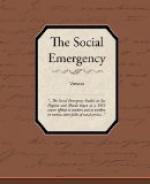The little child will understand and even idealize plant and animal life if he learns of plant and animal life first in human terms. His moral development is menaced if this process is reversed so that a counter-tendency is set up,—a tendency to interpret the human functions in animal terms. It is better for the child to humanize animal relationships than to animalize human relationships,—and this can be achieved only through a constant observance of the human basis in the sexual as indeed in all phases of a child’s education. The little book which I mentioned at the beginning does just this,—it introduces the child to the home life of animals, it interprets animal life in ideal terms. It lays a basis for relating later information of sex functions to the home life of plants and animals. At the proper time in a child’s development, he is prepared to place a true and intelligent value upon the differences between the home life of animals and the home life of human beings, and to justify intelligently and with full consent of mind and sanction of conscience the differences of sexual practice as between plants and animals on the one hand and human beings on the other. He is prepared to see that it is enough for the sex life of plants and animals that it be physically and biologically normal. It is not enough for the true and ideal family life of man that the sex relation should be biologically normal. It must be morally normal—normal, that is, to the highest human interests.
The more concrete and detailed problems of method would not be serious if every child’s mind were a blank or even if its instincts were analogous to normal animals. But neither is the case, and the problem of method and means of instruction is therefore amazingly complicated. If the sex life of a child were analogous to that of normal animals, it would not awaken at all until puberty. And if the child’s mind were a blank on sex matters, it need only be kept from the invasion of wrong ideas from outside. But the sex life of a child begins long before puberty,—both physically and mentally. In the child, the physical signs are more or less detached from the mental signs,—at this or that phase of a child’s life, the one or the other may have precedence; but the two are subtly interrelated, and tend to contribute to each other. In the human being a sex life that is normal, both biologically and morally, is an achievement; not a thing which would take care of itself if the child were left alone and merely kept ignorant of the abnormal. The human child is born abnormal,—that is to say, with latent possibilities of sexual abnormality, physical and mental,—and this by virtue of the mere fact that he is not only with animals a creature of instinct, but with humanity a being with ideas.




